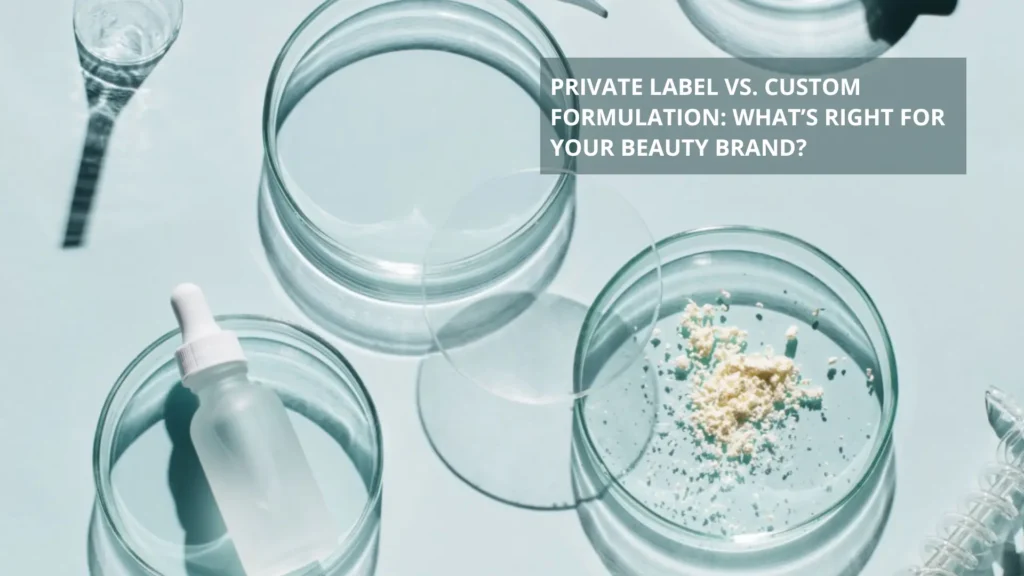📘 By Biocylab Blog | May 2025
🕒 Reading Time: 7–8 minutes

When launching a cosmetic brand, one of the first major decisions you’ll face is this: Should you go with a private label solution, or develop your own custom formulation? Each approach offers distinct advantages and potential trade-offs depending on your vision, timeline, and budget.
This article breaks down both options—so you can make an informed choice that aligns with your brand’s identity and growth goals.
Introduction
In today’s competitive beauty market, speed, innovation, and authenticity all play critical roles in brand success. Your decision between private label and custom formulation will influence not only your product range but also your brand’s flexibility, positioning, and long-term scalability.
Let’s explore both paths to help you identify which model is the best fit for your business strategy.
Step 1: What is Private Label Manufacturing?
Definition:
Private label refers to pre-existing formulas developed by a manufacturer that you can brand and sell under your own label. You typically select from a catalog of ready-to-market skincare, haircare, or makeup products.
Pros:
- 🚀 Fast Time to Market – Launch in a matter of weeks.
- 💰 Lower Investment – No R&D costs, minimal order quantities.
- ✔️ Tested Formulas – Products are already stability-tested and regulatory-compliant.
- 🔁 Easy to Scale – Perfect for testing concepts quickly or building a broad portfolio.
Cons:
- ⚠️ Limited Differentiation – Other brands may sell the same formula.
- 🎨 Limited Customization – Few changes can be made to texture, ingredients, or claims.
Step 2: What is Custom Formulation?
Definition:
Custom formulation involves creating a unique product from scratch with the help of chemists or laboratories. You determine the texture, ingredients, active concentrations, fragrance, and more.
Pros:
- ✨ Full Product Uniqueness – Your formula is exclusive to your brand.
- 💎 Premium Branding – You can market innovation and quality in your storytelling.
- 📈 Higher Profit Potential – Unique products often justify premium pricing.
- 🌿 Ingredient Control – Ideal for clean beauty or “free-from” claims.
Cons:
- 🧪 Longer Development Cycle – Can take 3 to 6 months or more.
- 💸 Higher Upfront Costs – Includes R&D, stability testing, and regulatory validation.
- 🏭 Higher MOQs (Minimum Order Quantities) – Not ideal for small batches.
Step 3: When to Choose Private Label
Private label might be the right choice if:
✅ You’re launching your first cosmetic line and want to minimize risk.
✅ You want to test the market quickly before committing to larger investments.
✅ You need cost-effective, fast production to meet seasonal or trend-based demands.
✅ You’re building a white label or drop shipping business model.
Pro Tip:
Use private label to validate your concept and generate cash flow—then reinvest into developing custom products later.
Step 4: When to Choose Custom Formulation
Custom formulation is the better option if:
✅ Your brand is positioned as luxury, innovative, or science-backed.
✅ You want to own the formula IP and create a strong barrier to entry.
✅ You’re focused on performance, unique claims, or niche formulations (e.g. sensitive skin, Ayurvedic, anti-aging).
✅ You want long-term differentiation from competitors.
Real Case Example:
Brands like Drunk Elephant and Fenty Skin started with custom formulations to deliver truly unique experiences—earning industry credibility and consumer loyalty.
Step 5: Comparing Costs and Time to Market
| Factor | Private Label | Custom Formulation |
| Time to Market | 2–8 weeks | 3–8 months |
| Upfront Cost | Low | High |
| Formula Ownership | No | Yes |
| Minimum Order Quantity | Low (100–500 units) | Medium to High (500–2000+ units) |
| Product Differentiation | Low | High |
| Best For | Fast launches, MVPs, trend testing | Unique brand positioning, premium market entry |
Hybrid Strategy:
Some successful brands use a mix—starting with private label to enter the market, and later integrating custom formulations as they scale.
Conclusion
There’s no one-size-fits-all answer. The right manufacturing model depends on your brand goals, resources, and vision. Private label is ideal for speed and simplicity, while custom formulation is the way to go if you’re building something unique and long-lasting.
At Biocylab, we offer both private label solutions and custom formulation services—tailored to your ambition and timeline. Whether you’re launching your first product or evolving an established brand, we’ll help you choose the right path.
🔬 Need expert guidance to decide what’s right for your beauty project?
Book a consultation with Biocylab and let’s design your next best-seller.

